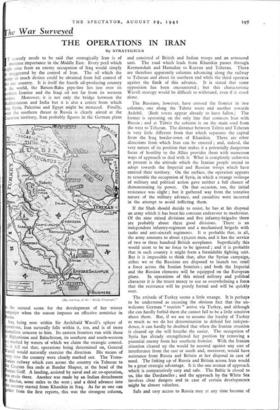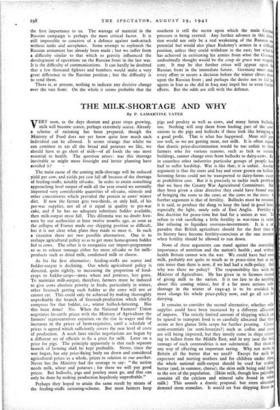h e War Surveyed
THE OPERATIONS IN IRAN
By STRATEGICUS
T scarcely needs to be said that strategically Iran is of immense importance in the Middle East. Every peril which ght arise from an enemy occupation of Iraq would simply exaggerated by the control of Iran. The oil which the emy so much desires could be obtained from full control of s one country. It is itself the fourth oil-producing country the world, the Batum-Baku pipe-line lies just over its thern frontier and the Iraqi oil not far from its western ders. Moreover, it is not only the bridge between the diterranean and India but it is also a centre from which aq, Syria, Palestine and Egypt might be menaced. Finally, ce the southern thrust in Russia is clearly aimed at the ucasian territory, Iran probably figures in the German plans
[By courtesy of the "Daily Telegraph."
the natural scene for the development of her winter paign when the season imposes an effective armistice in ussia.
Iraq being now within Sir Archibald Wavell's sphere of perations, Iran naturally falls within it, too, and is of more ediate concern to him Its eastern frontiers run with those I Afghanistan and Baluchistan, its southern and south-western e washed by waters of which we claim the strategic control. 0 it fell out that, operations being determined on, General avell would naturally exercise the direction. His means of ratty into the country were clearly marked out The Trans- anian railway which cuts across the country via Teheran to e Caspian Sea ends at Bandar Shapur, at the head of the ersian Gulf. A landing, assisted by naval and air co-operation, as made there. Another was made by an Indian detachment t Abadan, some miles to the west ; and a third advance into country started from Khanikin in Iraq. As far as one can ather from the first reports, this was the strongest column, and consisted of British and Indian troops and an armoured unit. The road which leads from Khanikin passes through Kermanshah and Hamadan to Kazvan and Teheran. There are therefore apparently columns advancing along the railway to Teheran and about its southern end while the third operates against the flank of this advance. It is stated that some opposition has been encountered ; but this characteristic Wavell strategy would be difficult to withstand, even if it stood alone.
The Russians, however, have crossed the frontier in two columns, one along the Tabriz route and another towards Ardebil. (Both towns appear already to have fallen.) The former is operating on the only line that connects Iran with Russia ; and at Tabriz the column is on the main road from the west to Teheran. The distance between Tabriz and Teheran is very little different from that which separates the capital from the Iraq border-town of Khanikin. There are other directions from which Iran can be entered ; and, indeed, the very nature of its position that makes it a potentially dangerous focus of hostility to the Allies provides them with numerous ways of approach to deal with it. What is completely unknown at present is the attitude which the Iranian people intend to adopt towards the Imperial and Russian troops which have entered their territory. On the surface, the operation appears to resemble the occupation of Syria, in which a strange mélange of military and political action gave neither a full chance of demonstrating its power. On that occasion, too, the initial resistance was slight ; but it gathered way from the tentative nature of the military advance, and casualties were incurred in the attempt to avoid inflicting them.
If the Shah should decide to resist, he has at his disposal an army which it has been his constant endeavour to modernise. Of the nine mixed divisions and five infantry-brigades there are probably about three good divisions. There is an independent infantry-regiment and a mechanised brigade with tanks and anti-aircraft regiments. It is probable that, in all, the army amounts to about 150,000 men, and it has the service of two or three hundred British aeroplanes. Superficially this would seem to be no force to be ignored ; and it is probable that in such country it might form a formidable fighting unit. But it is impossible to think that, after the Syrian campaign, either we or the Russians are disposed to launch too small a force across the Iranian frontiers ; and both the Imperial and the Russian elements will be equipped on the European plane. In operations of this mixed military and political character it is the truest mercy to use so overwhelming a force that the resistance will be purely formal and will be quickly over.
The attitude of Turkey seems a little strange. It is perhaps to be understood as excusing the obvious fact that the un- welcome German " tourists " arrive via Turkey, and although she can hardly forbid them she cannot fail to be a little sensitive about them. But, if we are to assume the loyalty of Turkey as much as we do her determination to defend her indepen- dence, it can hardly be doubted that when the Iranian situation is cleared up she will breathe the easier. The occupation of Syria has already strengthened her position by removing a potential enemy from her southern frontier. With the Iranian situation cleared up she would be assured against any sort of interference from the east or south and, moreover, would have assistance from Russia and Britain at her disposal in case of need. The linking up of Russia and Britain across Iran would be a great strategic advantage. It is the one avenue of approach which is comparatively easy and safe. The Baltic is closed to us, like the Dardanelles ; and the approach by the White Sea involves clear dangers and in case of certain developments might be almost valueless.
Safe and easy access to Russia may at any time become of the first importance to us. The wastage of material in the Russian campaign is perhaps the most critical factor. It is still impossible to conceive of a defence against tank-attack without tanks and aeroplanes. Some attempt to replenish the Russian armament has already been made ; but we suffer from a difficulty similar to that which so gravely influenced the development of operations on the Russian front in the last war. It is the difficulty of communications. It can hardly be doubted that a few thousand fighters and bombers would make a very great difference to the Russian position ; but the difficulty is to send them.
There is, at present, nothing to indicate any decisive change over the vast front. On the whole it seems probable that the southern is still the sector upon which the main Gentak .pressure is being exerted. Any further advance in this nieec, don would not only be .a real weakening of the Russian vial potential but would also place Budenny's armies in a difficuk position, unless they could withdraw to the east; but what fr has achieved in extricating his armies from what the Ger undoubtedly thought would be the coup de grace was inn cent. It may be that further crises will appear upon tit Russian front in the immediate future. Germany must mkt every effort to secure a decision before the winter closes dog upon the Russian front ; and perhaps the desire not to fail her agents in Iran as she did in Iraq may impel her to even further efforts. But the odds are still with the defence.



































 Previous page
Previous page